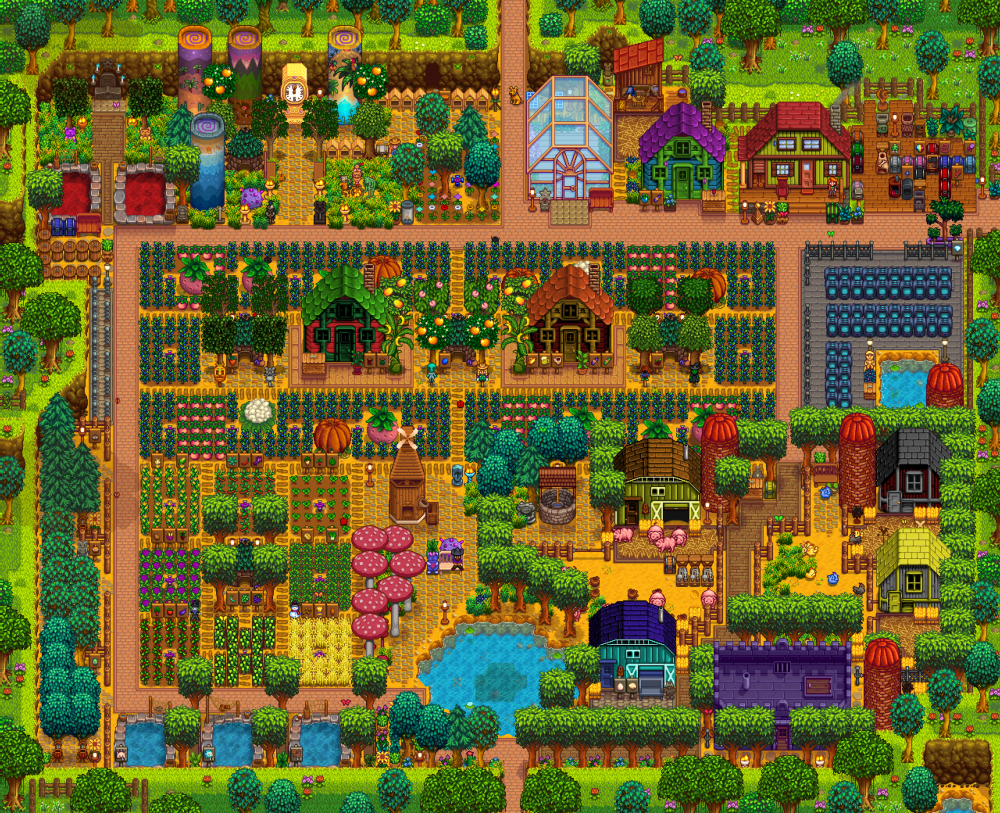In class, we examined a number of lenses by which Stardew Valley could be altered, and then experienced, in the form of various modifications (mods). I believe much of the inspiration and desire behind mods, naturally, is the translocation of human desires into whichever medium allows us to achieve those desires. Turning our neighbourhood into a war zone is illegal – so let’s just create a mod for Stardew Valley to become this. Similarly, as college students we probably don’t have the funds to develop a serious investment portfolio – let’s turn Stardew into our little investing haven with no downside.
I was fortunate to be in a group which discussed this idea of in-game time dilation, which has shaped my thinking for this blog. Let’s take the mod a little further: not only is time in-game equal to time in real life, and not only are you required to sleep in real life for your Stardew character to sleep in game – but the game is always running. I believe this brings in a more interesting question that at initial glance. Stardew Valley always running means that, just like in our world outside, we are running out of time. For example, every action we take, in every period of time, we are faced with an opportunity cost calculation. When we watch Netflix, we are sacrificing working on a project, learning a language, or getting ahead on our problem set. On the other side of the same coin, the fifteenth hour spent on our work sacrifices the Netflix episode that allows us to recharge. My point is as follows: every decision we make entails, by virtue of time, some kind of sacrifice. With infinite time, opportunity cost calculations no longer exist. So what does this Stardew Valley modification mean?
Firstly, that we are now faced with a relatively constant opportunity cost, everywhere, at all times. Instead of our baseline opportunity cost being at, roughly, zero (in the case of doing nothing), it is now at whatever we value our progression in Stardew valley. I believe this means that, essentially, it will be in extremely rare cases that we ever do nothing, so long as we enjoy the game. This everlasting option that provides us a constant level of gratification forever changes our calculation for what we do at any given moment.
Secondly, but similarly, we are faced with a perpetual choice about which life to improve. Just as in a dream, your progression is locked within your dream (since you’re unconscious), by turning Stardew Valley into a parallel life you are now faced with a similar decision. (In this case, I will ignore the analytical benefits of the game that you can extrapolate to real-life, since these are just as achievable without the mod). Do you progress in the real world, and let your Stardew character’s relationships waste away, and crops die, or do you progress in the virtual world at the expensive of your real life? With such a modification, this choice is here to stay.
So what do I believe is important about this entire hypothetical mod, and what does it mean? Ultimately, I would describe it less as time dilation, but more as the implementation of time into Stardew Valley. With an in-game day lasting only 13.5 minutes, we have the ability and choice to pause time by logging off and coming back later. We can essentially play God. With such a modification, we would neither have the choice nor ability – and just as time is our master, now so is Stardew Valley.
The real-world ramifications of this, I believe, can be very troublesome. Creating such a FOMO for video games can be extremely detrimental to someone’s time-management, and by extension their mental health. Certain games have already mastered this art. In Fifa, for example, if you miss a Weekend League or don’t meet your weekly win quota, your team immediately feels the ramifications. You’re left behind your competition, which means you are relatively lacking, and as a result are able to achieve fewer wins. This vicious cycle continues. Similarly, each ‘promo’ lasts only a short period of time – and missing even a small portion means losing out on the rewards. The same goes for freemium models such as WarZone or Fortnite: pay for this season’s superior pass and unlock the superior items, which you will never be able to do again. One slightly more nuanced, and natural example of this fuelled why I quit playing Fortnite. I realised that, even though I could sit down for an hour or two to relax and improve along the way, my average competition was someone half a dozen years younger than me with half a dozen additional daily hours they could spend on the game: I was improving at 20% the rate they were. Ultimately, I believe an important component of making a game addictive is implementing some form of time into a competitive game. I certainly felt this first hand with Fifa. And so long as the game mechanics are engaging enough to make the rewards worth reaping, the game can persist as something remarkably addictive.
